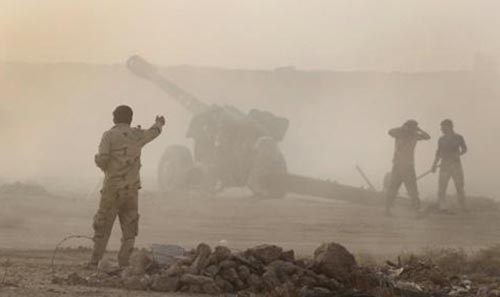Twin assaults in Syria, Iraq pile pressure on IS
Beirut: Kurdish-Arab forces launched a major assault against the Islamic State group in Syria's Raqa province Tuesday and Iraqi forces advanced on it in Fallujah, piling pressure on the jihadists in two strongholds.
The twin offensives marked some of the most serious ground efforts against IS since the group declared its self-styled "caliphate" straddling the Syrian-Iraqi border in 2014.
Territory under IS control has been steadily shrinking for months but it has carried out a wave of attacks including bombings in the Syrian regime's coastal heartland Monday that killed 177 people.
It was the "deadliest bomb attack" on any regime-held area in Syria's five-year war, according to the Syrian Observatory for Human Rights monitoring group.
The Syrian Democratic Forces on Tuesday announced its largest offensive to date against IS territory north of the IS stronghold of Raqa city.
The offensive was aimed at pushing IS from the province's north and securing other areas, the alliance said in statement on Twitter.
Baghdad-based US military spokesman Colonel Steve Warren confirmed the assault, saying it was "putting pressure on Raqa".
US air strikes would support thousands of SDF fighters, some of whom had been trained and equipped by American forces, he said.
If Raqa falls, "it's the beginning of the end of their caliphate," Warren said.
SDF spokesman Talal Sello said an assault on Raqa city "is not in our plan now".
A source within the Kurdish People's Protection Units said US ground forces would take part in the attack, but Sello denied this.
Just before the SDF announcement, Russia said it would be ready to coordinate with both Washington and the SDF in an offensive for Raqa.
- End to 'IS myth'? -
The US rejected a Russian proposal last week for joint air operations against jihadist groups in Syria.
The anti-IS coalition headed by Washington has set its sights on Raqa in Syria, as well as Fallujah -- and eventually IS's main bastion of Mosul -- in Iraq.
"It's clear that if the US wants to eliminate IS, it has to attack it on multiple fronts at the same time," said Washington-based Syria analyst Fabrice Balanche.
"Cutting the route between Raqa and Mosul isn't difficult today. It will put an end to the myth of a transnational IS," he said.
On Tuesday, Iraqi forces closed in on Fallujah after capturing the nearby town of Garma and cutting IS off from one of its last support areas.
"Federal forces advanced towards the east of Fallujah early today from three directions," said police Lieutenant General Raed Shakir Jawdat.
The Hashed al-Shaabi umbrella paramilitary organisation, dominated by Tehran-backed Shiite militias heavily involved in the operation, said ground was also gained south of Fallujah.
With forces converging, concerns grew that the estimated 50,000 civilians believed to still be inside had nowhere to go.
"Families who have been suffering food and medical shortages over the last months now risk being caught in the crossfire," said the Norwegian Refugee Council's country director Nasr Muflahi.
It was "absolutely vital that they are granted safe routes out of there," he added.
Officials from Anbar, the vast western province in which Fallujah is located, said small numbers of civilians had managed to sneak out.
- Scramble to save ceasefire -
A Fallujah resident reached by telephone said there was heavy shelling on the northern edge of the city.
"Daesh (IS) is still imposing a curfew, preventing people from coming out on the street," said the man, who gave his name as Abu Mohammed al-Dulaimi.
It was unclear what kind of defence IS was prepared to put up in Fallujah, a city that looms large in modern jihadist mythology since 2004 battles that saw US forces suffer some of their worst losses since the Vietnam War.
Iraqi and US-led coalition aircraft have been pounding Fallujah and its surroundings to support the operation.
The offensives came as Washington and Moscow scrambled to salvage a shaky ceasefire between the regime and non-jihadist rebels intended to pave the way for peace talks.
The US envoy for Syria has urged rebels to respect the February 27 ceasefire after they gave its brokers -- Washington and Moscow -- until Tuesday afternoon to stop an advance on rebel strongholds outside Damascus.
"We recognise that the CoH (Cessation of Hostilities) is under severe stress, but believe that to abandon it now would be strategic error," Michael Ratney tweeted.
Staunch regime ally Russia also called for a 72-hour truce in Eastern Ghouta and Daraya near Damascus from Tuesday.
And the two areas were relatively calm, with clashes subsiding since dawn, said the Observatory.
Related Posts

